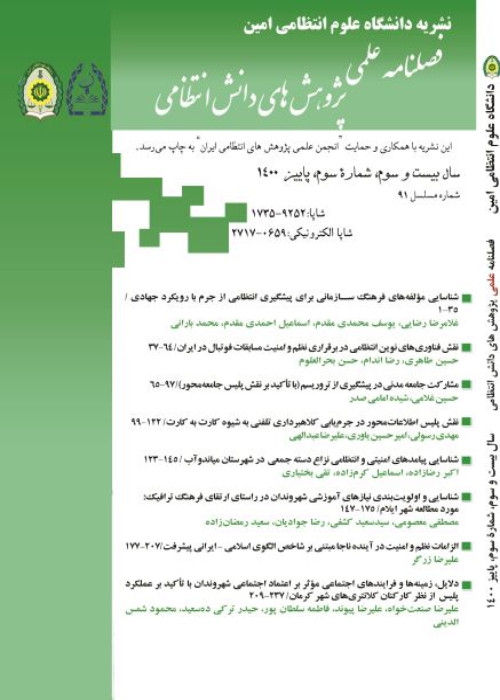Designing Emotion Management Model for Police Special Forces (Case Study: Kurdistan Province)
Lack of emotion management skills, especially anger management, can lead to negative emotions, stressful relationships, cautious behavior, avoidance of mission environments, and reduced job satisfaction in Special Forces. This research has been conducted in order to design the emotion management model for the Police Special Forces of Kurdistan Province.
This research is a "qualitative" type that has been conducted using grounded theory. The statistical population of this study consisted of professors of psychology, experts and elites of the Special Unit, who were purposefully selected from this community and with 10 individuals we reach to the saturation level. Three-stage open, axial, and selective coding are used to analyze the data.
Data analysis based on grounded theory showed that police special unit emotion management consists of ten concepts: emotion regulation (6 indicators), tension and stress in the special unit (5 indicators), self-confidence (5 indicators), organizational commitment (6 indicators), spiritual attitude (5 indicators), job satisfaction (4 indicators), resilience (4 indicators), team performance (3 indicators), creativity (5 indicators) and motivation (3 indicators).
What was concluded as a result of the research was that in the Special Unit Emotion Management Model, the three components of "self-confidence", "creativity" and "spiritual attitude" along with interventional conditions such as job satisfaction, organizational commitment and team performance in the context of stress and tension affect its main component, i.e., cognition and emotion regulation, and the individuals who benefit from cognition and emotion regulation are motivated by the strategy of resilience; the motivation, which, after its formation, interacts with the main component of emotion management model, namely cognition and emotion regulation.
- حق عضویت دریافتی صرف حمایت از نشریات عضو و نگهداری، تکمیل و توسعه مگیران میشود.
- پرداخت حق اشتراک و دانلود مقالات اجازه بازنشر آن در سایر رسانههای چاپی و دیجیتال را به کاربر نمیدهد.


